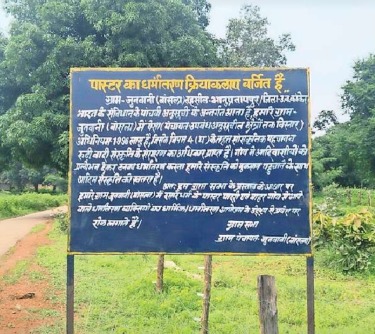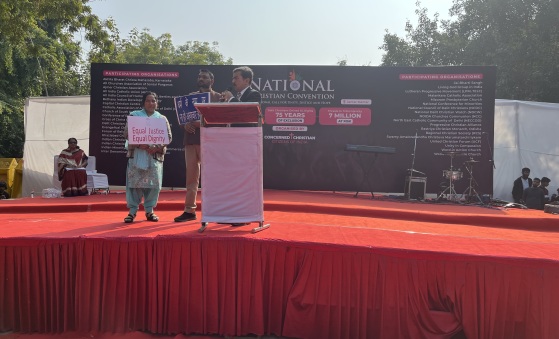
Residents of Tekathodha village in Chhattisgarh’s Kanker district erected a large signboard at their village entrance on October 13, declaring that Christian pastors, priests, and religious workers are prohibited from entering. Villagers claim this makes Tekathodha the twelfth village in the district to implement such a ban, though similar claims have been made about other villages in the area.
The village, located in the Bhanupratappur development block, took the decision following what residents described as rising cases of religious conversion. According to villagers, eight families in Tekathodha have converted to Christianity in recent times, which they say has affected the village’s social structure and traditional lifestyle.
The signboard cites the Panchayat Extension to Scheduled Areas Act of 1996, specifically Rule 4(d). Villagers interpret this provision as granting gram sabhas the right to protect their cultural identity and traditional culture. The board states that the decision aligns with the spirit of self-governance and cultural security provided to tribal areas under the Fifth Schedule of the Constitution.
In statements reported by local media, villagers said they are not opposing Christianity or any other religion but are against conversions they allege are carried out through inducements and temptations. “Our simple-minded people are being made to change their religion in the name of greed, allurement, or help, which is a threat to our tribal culture,” villagers were quoted as stating.
Charbhatha village in the Naraharpur block took similar action on October 11, with residents installing a comparable ban. Media reports described it as also becoming the twelfth village in Kanker district to implement such restrictions. Residents there claimed that eight families had adopted Christianity, which they said was impacting traditional customs and the cultural system of society.
The recent wave of bans follows an incident approximately five months earlier in Jamgaon village, where a dispute erupted over the last rites of Somlal Rathore, a resident who had converted to Christianity. Following his death, villagers opposed conducting his funeral according to his adopted faith, and the gram sabha subsequently passed a resolution banning the entry of pastors and priests.
On October 13, a gram sabha meeting was convened at the Sheetala temple in Nawadabari village where two tribal families were publicly brought back to Hinduism in what organisers termed a ‘ghar wapsi’ or homecoming ceremony. Manbahal Vatti and Baharin Matiyara announced their return in what appeared to be a scripted event attended by village leaders and community members.
The families stated they had converted to Christianity several years earlier but now claimed they were “influenced” and “misled” by a pastor. They alleged facing pressure during Christian prayer meetings not to worship village deities. The language used mirrored narratives promoted by Hindutva groups, portraying Christian practice as inherently divisive and conversion as deception rather than legitimate religious choice.
Following the public ceremony, the gram sabha unanimously passed a resolution banning all outside pastors, priests, and Christian preachers from entering Nawadabari. The decision effectively isolates Christian families in the village from external religious support and pastoral care, leaving them vulnerable to further community pressure.
A similar pattern unfolded in Sarona village’s Bharripara area two days after a coordinated meeting of representatives from 35 villages. The meeting, explicitly organized to address what participants called the “problem” of religious conversion, decided to target converted families and pressure them to return to Hinduism. That two families, led by Ramprasad Salam and Kapil Markam, publicly left Christianity immediately following this multi-village mobilization suggests organized coercion rather than voluntary choice.
At the Sarona ceremony, the families were subjected to a public ritual where villagers washed their feet and performed aarti while chants of ‘Jai Shri Ram’ and ‘Har Har Mahadev’ echoed throughout. The spectacle served both as a warning to other Christian families and as a demonstration of Hindutva mobilization in the region. The families were required to pledge permanent adherence to Hinduism before being declared “reintegrated” into village society, language that reveals Christians are viewed as outside the community.
District panchayat vice president Tara Thakur declared that “religious conversion weakens our culture and traditions,” framing Christianity as alien to tribal identity despite its 150-year presence in the region.
Village sarpanch Deepika Vatti attributed conversions to “greed and misinformation,” employing standard Hindutva rhetoric that denies converts agency over their religious decisions. She called for making younger generations “aware of Indian culture and Hindu traditions,” explicitly equating Indian identity with Hindu religion.
Most revealingly, former BJP mandal president Yashwant Surojiya actively participated in the Sarona ceremony, stating, “Our religion is the identity of our culture. Cutting yourself off from your roots by falling for any inducement is not right.” His prominent role in what village authorities claim are purely local decisions exposes the political coordination behind these events. The presence of BJP leadership at public reconversion ceremonies, combined with the organized 35-village meeting that preceded them, points to systematic mobilization by Hindutva organizations working in coordination with the ruling party.
A Christian leader working in the region, who spoke to Christian Today on condition of anonymity citing security concerns, provided a different perspective on the recent developments. “Kanker district has become a hotbed of the Vishwa Hindu Parishad and other Hindutva organizations who have systematically poisoned the minds of villagers against the Christian faith, even though Christianity has been part of Kanker district for over 150 years,” he said.
The leader described a coordinated strategy of infiltration and influence. “The BJP government is actively supporting these Hindutva groups who make their way into villages through the deployment of teachers with a Hindutva mindset. They begin poisoning the minds of people against Christians. The administration has also been filled with people holding a Hindutva ideology, and this has resulted in much antagonism against Christians.”
He pointed to the role of local media in creating a hostile atmosphere. “Local vernacular media, which works hand in glove with Hindutva groups, portrays a consistently negative image of Christians while creating an atmosphere of conspiracy, alleging that Christians are trying to convert people through inducements. The whole system has turned against us.”
Speaking to Christian Today, the Reverend Vijayesh Lal, General Secretary of the Evangelical Fellowship of India, said, “The events in Kanker district reveal a coordinated pattern of persecution against Christians in Chhattisgarh. Village bans on clergy, public reconversion ceremonies, and denial of burial rights are systematic violations of constitutional freedoms guaranteed under Articles 25 and 19. The false narrative of forced conversions is being weaponized to justify social boycott and isolation of Christian families. The misuse of PESA provisions to override fundamental rights threatens India’s constitutional commitment to religious freedom and raises urgent questions about the protection of minority communities.”
The developments in Kanker are part of a documented pattern of Christian persecution in Chhattisgarh that has intensified over the past decade. The Evangelical Fellowship of India’s Religious Liberty Commission documented 150 incidents of violence and discrimination against Christians in Chhattisgarh in 2024, making it the second most hostile state for Christians in India after Uttar Pradesh.
The Bastar region, which includes Kanker district, has witnessed systematic targeting of Christians since 2014. In June of that year, shortly after the BJP came to power nationally, 50 village councils in Bastar passed resolutions restricting non-Hindus from practicing and propagating their religion, declaring that Christians were to be socially boycotted until they converted to Hinduism. The Chhattisgarh High Court quashed these resolutions in 2015 as unconstitutional.
The denial of burial rights to Christians has become what Archbishop Victor Thakur of Raipur called “a growing trend and a serious concern” across Chhattisgarh. In recent months, more than 400 people from 22 villages in Kanker gathered on October 5, deciding to strip Christians of their burial rights and deny believers access to burial land. Archbishop Thakur attributed the persecution to political actors, stating, “Those behind this trend are some of the political parties and anti-social elements who want to rule the country by the divide and rule method.”
The use of PESA provisions to justify restrictions on Christian clergy has been challenged by legal experts who argue that these provisions cannot override fundamental constitutional rights. Articles 25 and 19 of the Indian Constitution guarantee freedom of religion and freedom of movement throughout Indian territory.
The coordinated nature of village bans across Kanker, the organized reconversion campaigns involving multiple villages, and the active participation of BJP political leadership reveal a systematic pattern of targeting religious minorities under the guise of cultural preservation. For Christian families in Kanker, the spreading restrictions mean a choice between abandoning their faith or facing social isolation, denial of basic services like burial rights, and exclusion from their own communities. The situation raises fundamental questions about the protection of religious freedom and minority rights in contemporary India.




